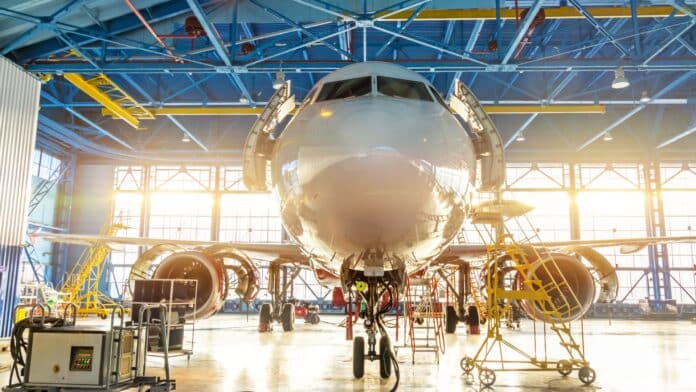In aviation maintenance, enterprise resource planning (ERP) is essential. ERP for aviation has two main functions: modeling the business process and recording, storing, managing, and interpreting business data. As a result, complexity is likely at its peak in the maintenance of airplanes, where asset structures are always complicated and subject to a wide range of stakeholders and life cycle management standards.
Additionally, aviation operations require a very high service level and run round-the-clock. The number of airplane maintenance regulations worsens the situation, which frequently prompt audits by aviation authorities or clients. With this, an ERP software is crucial for the aviation industry.
HashMicro’s ERP System is one of the best systems to help your company manage its processes. Continue to read the article and view HashMicro’s ERP pricing scheme to learn more about ERP for aviation.

Table of Content:
Table of Content
ERP Role in Aviation Business
Enterprise resource planning covers a number of daily tasks for aviation companies, such as finance, maintenance operations, sales, purchasing, and human resources, including keeping records of aircraft maintenance. It is also known in the aviation business that the safety of driving an aircraft, reliability, availability within a budget, and regulatory compliance depend on aviation maintenance ERP platforms. That is why, despite the revolution of technology such as big data, AI, and IoT, the use of ERP for aviation business is critical for decision-making. By using an ERP, aviation businesses will have full control, visibility, and data collection that can improve overall business performance.
Integrated ERP for the Aviation Industry
Maintaining aircraft in good working order and on schedule is essential for airlines to provide the appropriate level of customer experience. Thus there is a great deal of reliance on making sure the right part is available at the right time. ERP consistently aims to integrate various maintenance management functions. This is because organizations must implement effective master data management in order to fully benefit from big data and machine learning when a single integrated enterprise resource planning does not cover the functional landscape.
Integration of inventory management with the solution for resource planning and maintenance execution is practically required. The most effective resource planning and maintenance solutions must have highly customizable features, such as the capacity to link with an existing inventory management system that can be a component of an aviation organization’s long-term IT strategy.
ERP Main Features for the Aviation Industry
Before picking an ERP system, you have to know what your company needs, so you can ensure that the system you choose fulfills them. This section will discuss the features of the ERP system that must exist.
Reporting & analytics
Reporting and analytics capabilities ensure real-time reporting, searches, key performance indicators (KPIs), and dashboards that enable firms to take meaningful steps toward strategic decision-making and future planning.
Accounting & financials
Accounting is an essential component of every organization. With an aviation-specific ERP, you can have accounting processes and capabilities that can quickly handle finance and accounting operations with high compliance. This would enhance corporate performance and ensure accuracy while decreasing back-office expenses.
Fixed asset management
Fixed asset management is a part of accounting and finances, and with the help of an ERP, you can keep track of assets owned by the firm and those leased, as well as their depreciation costs and amortization schedules. With seamless integration of fundamental accounting concepts and comprehensive asset reporting.
Resource management
When rostering, scheduling, and assigning crew members to tasks and flights, work in concert with resource management technologies. Better flight duty time monitoring and control may be possible with the help of this capability. Manage all areas of HR on a consolidated process, including crew compensation, bonuses, additional expenses, paperwork, training, and vacation management.
Inventory & fleet management
Inventory management is important because the aviation sector requires a lot of money. The objective is to lessen the potential for capital to become locked up, for example, in surplus inventory or when airplanes require maintenance.
An ERP for aviation can track when products are received, held, and sold, and in the case of out-of-service aircraft, when they are out for maintenance. Monitoring these circumstances enables better inventory and fleet coordination and real-time decision-making.
Additionally, fleet management handles maintaining and organizing various types of aircraft using databases that detail technical information, maintenance schedules, MELs (minimum equipment lists), resource tracking, and other information.
Choosing The Right ERP for Your Business
Choosing the right ERP for your aviation business is a challenging task. You are not only looking for a system, but you are looking for a tool that can integrate your core business functions. This part will discuss some steps to pick the right ERP System.
-
-
- Create an ERP research team
-
An ERP research team helps your company make sure that it knows its greatest needs and avoids missing any key considerations for picking an ERP System. This team consists of people from every area of your company who can give viewpoints from their area.
-
-
- Determine your company’s ERP needs
-
Start assessing your top requirements for an ERP system with your ERP research team. As you brainstorm with your team, strike a balance between the organization’s current problems and its future requirements.
-
-
- Evaluate ERP providers
-
It could be overwhelming to narrow down your ERP system providers. To make it easier, you can narrow your choices by learning about their industry experience, ERP customization, applications, flexibility, and reporting ability.
-
-
- Evaluate ERP vendors
-
Once you have narrowed your choices, your company has to secure the vendor that can provide the most effective and efficient implementation with continuous support.
-
-
- Interact with the vendor’s clients
-
Most vendors can supply you with a testimonial, but such testimonials are typically provided immediately after the product’s introduction. It is best if a vendor can connect you with one of their clients who can describe their experience. Be sure to inquire about continuous support, training, and the relationship between the vendor and the organization.
Conclusion
As we now know, an ERP for aviation is crucial. An ERP company has to go through many constant processes and can only be helped by using an ERP system. That’s because the ERP system has many integrated features to help various companies run effectively. These features help companies in their reporting, analysis, accounting, inventory, and other activities.

Although all ERP systems have various functions, not all systems can meet your company’s needs and standards. Therefore, you must know how to choose an ERP system that suits your company’s needs. HashMicro is an IT company that provides ERP for aviation. You can customize the HashMicro ERP System to meet all your company’s needs, making your company’s activities more efficient. You can download the HashMicro ERP System pricing scheme or start a free demo by filling out the form.






















































